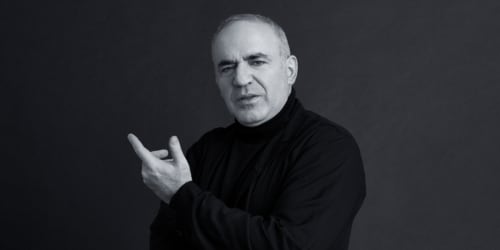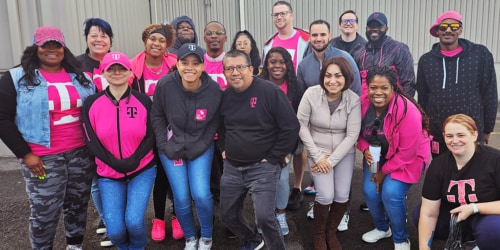One of the few stories to rival the pandemic this past year has been the runaway success of the Netflix show that in itself ignited something of an epidemic — in chess. From its debut last October to its Golden Globes and more recent Emmy wins, The Queen’s Gambit tells the unlikely tale of an orphan who combines rare skill and controlled substances to rise to the top of the chess world. And while a lot of attention has been bestowed upon actress Anya Taylor-Joy, who plays the main character, Beth Harmon, there’s a real-life chess Grandmaster who helped guide the gameplay itself: former World Chess Champion Garry Kasparov, himself a true wunderkind in the world of professional chess, the youngest player ever to earn the title of World Champion at the tender age of just 22.
As a technical consultant for The Queen’s Gambit — the titular name for the opening move that fuels Harmon’s success — Kasparov, now 58, lent his considerable expertise and know-how to make the actual chess games as believable as possible. (Spoiler alert: Um, it is! It’s also beautiful and riveting to watch.)
And now, with the online and app-based platform Kasparovchess, he wants to help make you a chess champion too.
“The goal of Kasparovchess is to make everyone love chess as much as I do,” says Kasparov. “Well, almost!”
Here he talks more about his behind-the-scenes role in The Queen’s Gambit, his own (albeit, unscripted) chess drama — and teaming up with the T-Mobile Tuesdays customer rewards program to offer a free three-month subscription to Kasparovchess starting October 19. What are you waiting for? It’s your move!
Until recently, you were the most famous chess champion in the world. Now, it’s possible the fictional Queen’s Gambit heroine Beth Harmon is, largely thanks to your help. How does it feel to imbue your mastery into this character? Have you enjoyed her success as much as your own?
It was a very enjoyable experience, even before the show became so popular — much to my surprise, by the way! It’s always annoying to see inaccurate and unrealistic portrayals of chess and chess players in movies and TV. For a show all about chess, it had to be better. Beth had to move and act like a chess master, and, thanks to Anya Taylor-Joy, she did.
The Queen’s Gambit becoming a huge hit has been great, because it’s great for chess. Beth Harmon has probably done more to promote the game, especially among girls, than all the real champions combined!
What aspects of Beth’s playing and experience is informed by your own?
What resonated with me is how obviously comfortable Beth is with chess, right from the start. I always said chess for me was like having a second native language. It just fit me perfectly. Beth Harmon is the same way. She was immediately captivated and with a limitless interest in the game.
Are you personally a fan of the show?
Very much so, and having watched it as well with my family I can appreciate it even more as a work of art and entertainment, not just a vehicle to promote my beloved game. It’s genuinely funny and moving, and the look and feel of it as a period piece is also great.
In terms of awards, you recently replied to a tweet with humor: “I won 11 Chess Oscars, I can live without an Emmy!” A nice mix of a little hubris and a little humility — are those both qualities that fueled your success in the chess world?
It was being honest, since I don’t think they give Emmys to chess consultants! So it was kind of the team to thank me after their Golden Globes win. And yes, to get to the top of chess, or any other competitive endeavor, you have to believe in yourself unquestioningly — while still acknowledging you have more to learn.
The show did end up winning 11 Emmys — but more importantly, its success increased chess set sales by 125% in the weeks after its premiere. Which is the bigger accolade?
Well, money talks! How often does a TV show or movie have such an impact in the real world, especially a positive one like getting more people to play chess? It’s rare and impressive to create a character and story so compelling that people want to imitate them. Awards are nice, but creating a whole new generation of chess players and fans? That’s amazing.
Another memorable pop culture phenomenon you were central to was your series of matches against the chess-playing supercomputer Deep Blue. Did that experience shape your thoughts about technology, or on the flip side, humanity?
Absolutely, although it didn’t happen right away. I admit it, I’m a sore loser. I was angry and wanted a rematch. I had never lost a match before and I wasn’t in the mood for philosophy. But I quickly realized what an important milestone it was, and that my loss to a machine was still a win for humanity. Even if the cover of Newsweek called it “The Brain’s Last Stand”!
As I wrote in my book Deep Thinking, it made it very clear to me that we really need to focus on what I call the human-machine relationship, not see it as a competition. AI is augmented intelligence, it’s a tool that makes us smarter.
What is your own relationship to technology today? Are you an avid mobile phone user? Are there certain apps you’d recommend?
Like many people of a certain generation — that is, an older generation — I have some love-hate moments with new technology. But I also had a lesson decades ago, when chess programs and databases came along and changed everything for professional players. You either adapted and learned to use them well, or you were a dinosaur. I adapted then, and I try hard to embrace it now, too, including my phone. And I always have my teenage daughter to help me if I need it!
The phone apps I use most frequently are for productivity and communication. It’s really the hub of my working life, doing many things I used to do on my laptop. This is a huge boon for someone who travels as much as I do. I use Skype, Signal — and, of course, the Kasparovchess app!
Ah, yes — Kasparovchess! You recently launched this online chess-learning platform. Can you tell us a little bit about what it is, and the plans you have for it in the near future?
It’s a place to share the richness of the world of chess with others. So primarily it’s a community based around learning and enjoying chess as students of the game and as fans. There’s a lot of content, a place to play, and live events to watch and play in. Of course, my name is on it, and there’s also a lot about me and my life in chess within, including a new masterclass video series. We’re going to keep adding new video lessons and adding new events for members.
Can you explain a little about the exciting partnership you’re embarking on with T-Mobile and T-Mobile Tuesdays?
Well, I am delighted to give exclusive full-access to my new masterclass episodes, as well as a three-month free Pro subscription to my platform Kasparovchess.com to the T-Mobile Tuesdays customers. With the three-month free Pro subscription, T-Mobile customers will be able to learn from the best players in the world with video and audio lessons, watch documentaries about chess culture and play against players from all over the globe.
You’ve mentioned the idea of connecting chess to the American public — does this help do that? And what is the future for chess in America … and Kasparovchess?
America has a great chess tradition, even if many today don’t know about it. Paul Morphy of New Orleans was the greatest player in the world in 1858. But somehow the game acquired a “nerdy” reputation that has been hard to shake, despite its popularity in pop culture and even with sports stars.
Chess isn’t difficult, it’s not only for geeky geniuses, and it’s a lot of fun. There’s a reason it has been around for so long all over the world, long before Harry Potter and Giannis Antetokounmpo played it!
There is already a big chess renaissance going on in the U.S., mostly thanks to the Saint Louis Chess Club. The U.S. won the Chess Olympiad gold medal in 2016, and the last challenger for the World Championship was an American from Brooklyn. Fabiano Caruana, not Bobby Fischer!
You have to promote chess from the top and the bottom. Support elite players and events and also the grassroots, the kids and classrooms at the base. Kasparovchess does both.
Save and redeem in the T-Mobile Tuesdays app by October 25, 2021, at 11:59 p.m. ET to receive a code valid for free access to Kasparovchess for 3 months plus exclusive access to the Garry Kasparov Masterclass. New subscribers only. Limit 1/Keysquare account. At the end of the 3-month trial, Kasparovchess subscription will auto renew at $9.99/mo. or $79.99/yr., unless cancelled. Offer cannot be combined with with any other offer, discounts, promotions, or previously existing subscriptions if customer has an existíng subscription. Offer is limited to one-time use.




